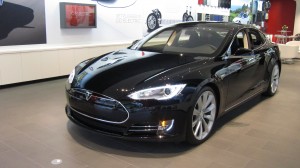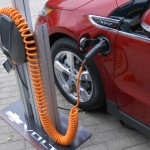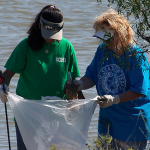Plug-In Rebates Finally Come to Texas, But Not For Tesla
Starting this week, if you buy or lease a plug-in vehicle in Texas, you’ll finally be able to apply for a rebate from the state of Texas. Thanks to a bill passed by the state legislature last session, most plug-in cars (like the Chevy Volt, BMW i3 or Nissan Leaf), as well as those that run on natural gas, can have $2,500 knocked off the price with the state incentive, which will be run by the Texas Commission of Environmental Quality (TCEQ). Additional federal incentives drop the price another $2,500 to $7,500, depending on the size of the battery. Choose the right plug-in, and you could knock ten grand off the price.
But there’s one big exception to the rebates. (Hint: it rhymes with “Cessna.”)
Tesla, the shining star in the electric car firmament, which also happens to be shopping around for a Sunbelt state to build a five-billion dollar battery factory, is legally not allowed to sell cars in Texas, which means they aren’t eligible for the state rebate. You can’t even test-drive a Tesla at a Texas dealership. In fact, there are no Tesla dealerships in Texas, only “showrooms,” which allow you to take a peek at the company’s Model S, but that’s about it. Staff there can’t even tell you the price of the car.
That’s all because of dealer franchise laws, and they’re not unique to Texas. These laws protect franchise dealers by forbidding auto manufacturers from selling cars directly to consumers. (This is why you can’t custom build and directly order your next 3 series from BMW online, for instance.) Tesla, which doesn’t franchise dealerships, can’t sell directly to customers in states like Texas. Want to order a Model S? You’ll have to get it from California. That hasn’t stopped Texans from buying Teslas, but it does make it an arduous process. Now Tesla is using the proposed battery factory to try and gets its way.
While state lawmakers were putting together the new plug-in rebates last session, they were also blocking a bill that would have made Tesla an exception to the franchise dealer laws.
But that bill never made it onto the House floor. It died in large part due to the lobbying and deep pockets of Texas auto dealers, who according to the watchdog group Texans for Public Justice spent $780,000 on lobbying and contributed hundreds of thousands of dollars to lawmakers and state officials, which helped defeat the bill.
Tesla spent about a third on lobbying as what the car dealers did last session, and Elon Musk only made $7,500 in contributions to lawmakers. In the meantime, Tesla installed a network of superchargers in Texas, allowing their drivers to charge up for free as they make their way through the state.
Which brings us to Elon Musk’s potential trump card: that battery factory. Tesla is calling it a “gigafactory,” and if all goes according to plan, it could become the largest manufacturer of car batteries in the world. The projected cost is 5 billion dollars, with 6,500 jobs, and it’s got states from California to Texas salivating at the thought.
Tesla is using the battery factor as a lever to get something it wants: an exemption from the state franchise dealer laws. Already you’re seeing state leaders in Texas on both sides of the aisle indicate a willingness to bend the rules for Tesla, from Governor Rick Perry, a Republican, to San Antonio Mayor Julian Castro, a Democrat.
Groundbreaking on the factory is supposed to start in June, but get this: Musk said in a conference call last week that they’re planning on breaking ground at two locations in two different states, but only building one factory in the end. That way, whichever state gives them the most sweeteners and regulatory efficiency will get the actual factory.
Yet it’s hard to imagine how Texas could promise Tesla special treatment before then. The state legislature, which would have to sign off on such a law, doesn’t meet again until January. And it seems unlikely that Gov. Perry would call them back for an emergency session just for a car company that would sell under two thousand cars a year in Texas.
But as Micheline Maynard points out in Forbes, Texas could make it work, if they time it just right:
“Once Tesla’s first and presumably second states are chosen, each will have to demonstrate that they can clear land on schedule and surmount bureaucratic hurdles in order to eventually be selected the winner.
Tesla officials haven’t said how long they will let the states duke it out. But in order to stay on track to produce the next generation Tesla car in 2017, a decision most likely will have to be made by the end of 2014 or sometime in 2015.”
After all, this is Texas. If a group of lawmakers can jump at the chance to poach a hot sauce factory that has been accused of being a public nuisance — even though its owner says they don’t plan to move and compares the U.S. government to communist Vietnam — perhaps the state will jump through some unexpected hoops to get Tesla to set up its battery shop here.



